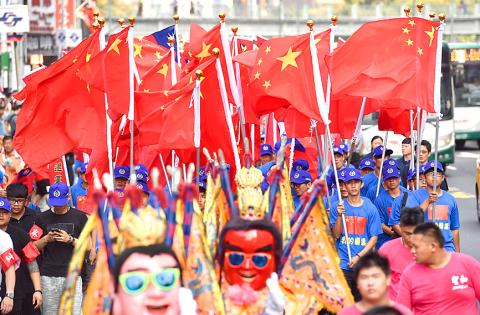The US-China Economic and Security Review Commission on Wednesday published its annual report, in which it quoted Victims of Communism Memorial Foundation research fellow Peter Mattis as saying that Beijing’s aim is to create “a ‘fake civil society’ that can be used against Taiwan’s democratic system.”
Mattis’ remarks were made in an article written in August last year in which he cited interlocutors, the commission, which was established by the US Congress in 2000, said in its report.
Beijing’s political warfare against Taiwan has included not only “military modernization and intimidation,” but also support for opposition parties and the spread of disinformation, it said.

Photo: Peter Lo, Taipei Times
These tactics seek to build “alliances” between the Chinese Communist Party (CCP) and groups in Taiwan, it said.
They undermine President Tsai Ing-wen’s (蔡英文) administration and Taiwan’s democracy, it added.
The report also said that Mattis’ discussions with people in Taiwan had led him to believe that “covert Chinese activities have increased in scope, sophistication and intensity.”
“For the first time in many years, Taiwan’s national security officials see change rather than continuity as a hallmark of Beijing’s intelligence and subversive operations,” the report quoted Mattis as saying.
In the report, the Washington-based commission also cited Global Taiwan Institute executive director Russell Hsiao (蕭良淇) as saying that Beijing’s “united front” strategy targets “10 constituencies.”
Those constituencies are “grass-roots villages, youth, students, Chinese spouses, Aborigines, pro-China political parties and groups, religious organizations, distant relatives, fishermen’s associations and retired generals,” the report said.
The commission also outlined some of the measures the government has taken to combat Chinese interference.
The National Security Bureau in 2015 established a big data and public opinion task force that works with the Ministry of Justice to monitor misinformation, “especially false news stories from [China] that aim to manipulate public opinion in Taiwan,” the report said.
The government has also dedicated pages on its various Web sites to clarifying rumors and false information, and is investigating connections between Beijing and specific groups in Taiwan, it added.
Tsai, who doubles as Democratic Progressive Party (DPP) chairperson, said on Facebook on Wednesday that there is no reason to be optimistic about the nine-in-one elections, as there are forces trying to suppress the nation’s democracy through “dirty tricks,” such as disinformation.
“Some people believe that if they talk about false information loud enough, it will become real. We must not let this kind of dirty trick prevail,” Tsai said, citing as an example false news reports that DPP Kaohsiung mayoral candidate Chen Chi-mai (陳其邁) cheated during a debate on Saturday last week by wearing an earpiece.

NATIONAL SECURITY THREAT: An official said that Guan Guan’s comments had gone beyond the threshold of free speech, as she advocated for the destruction of the ROC China-born media influencer Guan Guan’s (關關) residency permit has been revoked for repeatedly posting pro-China content that threatens national security, the National Immigration Agency said yesterday. Guan Guan has said many controversial things in her videos posted to Douyin (抖音), including “the red flag will soon be painted all over Taiwan” and “Taiwan is an inseparable part of China,” while expressing hope for expedited “reunification.” The agency received multiple reports alleging that Guan Guan had advocated for armed reunification last year. After investigating, the agency last month issued a notice requiring her to appear and account for her actions. Guan Guan appeared as required,

Japan and the Philippines yesterday signed a defense pact that would allow the tax-free provision of ammunition, fuel, food and other necessities when their forces stage joint training to boost deterrence against China’s growing aggression in the region and to bolster their preparation for natural disasters. Japan has faced increasing political, trade and security tensions with China, which was angered by Japanese Prime Minister Sanae Takaichi’s remark that a Chinese attack on Taiwan would be a survival-threatening situation for Japan, triggering a military response. Japan and the Philippines have also had separate territorial conflicts with Beijing in the East and South China

A strong cold air mass is expected to arrive tonight, bringing a change in weather and a drop in temperature, the Central Weather Administration (CWA) said. The coldest time would be early on Thursday morning, with temperatures in some areas dipping as low as 8°C, it said. Daytime highs yesterday were 22°C to 24°C in northern and eastern Taiwan, and about 25°C to 28°C in the central and southern regions, it said. However, nighttime lows would dip to about 15°C to 16°C in central and northern Taiwan as well as the northeast, and 17°C to 19°C elsewhere, it said. Tropical Storm Nokaen, currently

PAPERS, PLEASE: The gang exploited the high value of the passports, selling them at inflated prices to Chinese buyers, who would treat them as ‘invisibility cloaks’ The Yilan District Court has handed four members of a syndicate prison terms ranging from one year and two months to two years and two months for their involvement in a scheme to purchase Taiwanese passports and resell them abroad at a massive markup. A Chinese human smuggling syndicate purchased Taiwanese passports through local criminal networks, exploiting the passports’ visa-free travel privileges to turn a profit of more than 20 times the original price, the court said. Such criminal organizations enable people to impersonate Taiwanese when entering and exiting Taiwan and other countries, undermining social order and the credibility of the nation’s